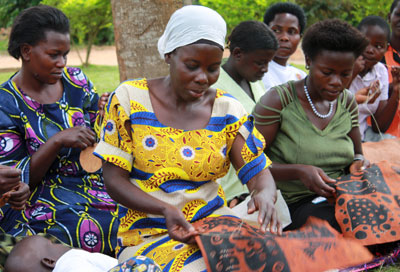February 18. 2015
Africa has gotten some things right, for example Ivory Coast, has become the world’s largest processor of cocoa, overtaking the Netherlands, from its previous role as exporter of the raw product. Processing has increased the Ivory Coast’s revenue considerably, and cannot be underestimated in terms of other avenues for increasing the country’s wealth. It cuts costs, and reduces waste and weight. Other African countries have done the same, and the continent, has seen one of the highest increases of processing of any continent. Africa has also been a hub for pension and sovereign wealth funds, because of its higher yield assets.
A young entrepreneur, from Togo, makes computers from e-waste. He and his friends couldn’t afford to buy computers when they went to university in Togo, so they came up with the idea of making them from cheap computer components and recycled parts, which can be plugged into TV screens. Africa is virgin territory and whilst the west is saturated, Africa is still up and coming, hence creating opportunities for entrepreneurs, to undertake high risk, high return projects. Other examples of where young entrepreneurs are developing, are, gaming, advertising and computer programming.
So what has changed in Africa? According to the economist, (in 2000, the economist stated that Africa was a basket case, we all remember this!) Africa’s growth is due, in part, to their development of manufactures and the services sector. Africa may become the next hub for light manufactures and services such as call centres, because of the boom in telecoms, if the growth is sustained, as India and Brazil, Indonesia and others have done.
The development of the financial sector in some countries has also been a factor. Some countries have had better management and economic development, e.g. Rwanda and Ethiopia. Cross border trade is also improving, gradually due to lighter tariffs and so on. Standard Bank states that Africa has one of the fastest growing middle class, in the world. This means higher spending powers, and more money in circulation for investment and returns, which in turn helps to reduce inflation if wisely invested. Foreign investment has also grown over the past decade, as has China’s heavy investment in Africa’s infrastructure and manufacturing sectors.
Other factors are also responsible such as, economic, political and social reforms, such as steady improvements in democratization, improvements in the business, trade, agriculture and construction. The Sunday independent states that less than one third of the continents, growth has come from resource exports, contrary to what is often claimed.
China’s role in Africa cannot be under-estimated, according to a MOFCOM source; china has invested over 21.23 billion as at 2012. It provides cheap interest rates on loans and credit to African countries, unlike western countries, which seized the opportunity to exploit Africa, demanding high interest rates on loans, in effect creating a situation where Africa pays back, to western countries, more than it gets in loans.
African demand for technology, telephony, mobile phones and agric info, is also causing a boom. There are however some complaints in some countries that China’s infrastructure projects in Africa, collapse after several years, such as dams and bridges. But what stops African engineers from undertaking these projects for themselves?
However, inequality, as well as income inequality, is a common issue that needs to be addressed and African countries are no exception. The IMF states that Africa needs to boost revenue, and do away with tax breaks such as fuel subsidies which largely benefit the rich. This should be replaced with alternatives such as conditional tax transfers. Investments should be made, in health, education and access to legal systems which are economic enablers.
Amartya Sen, a Nobel prize winner, spoke very eloquently, placing emphasis less on income inequality, and more on capability, i.e. the ability of the individual to do the things that he is able to do and that, he or she values. It’s about giving people choices and opportunities. He also spoke of the need for people to have their basic needs satisfied, dealing with social exclusion, and gender empowerment.
The question is though, what will make Africa’s growth sustainable for the future? And how can we learn lessons from other countries, and avoid making their mistakes? Ernst & Young state that for continuous sustainability, economic growth, enterprises development, job creation and human welfare need to be improved, as well as empowering stakeholders in their own development.
I would add that for sustainable growth emphasis should also be placed on liberalizing our economies slowly, protection of infant industries, greater investment in security, unemployment and youth unemployment, health, education and the provision of basic needs, and safety net. I would also say that further diversification of their economies needs to be put in place, and the reversal of the brain drain.
Finally, Greg Mills in Why States Fail, states that there are a combination of factors which need to be in place for African countries to avoid becoming failed states, these include, economic, social, security, political and governance issues. He goes on to state that putting a few factors in place, won’t work, such as economic or governance, if there is no security to create a conducive environment for them to develop.
According to one African musician, Africa doesn’t belong to Africa, but to western corporations and other higher interests pulling the strings. Has Africa been sold and resold unaware?
Source: Gloria Uzo Nweke



